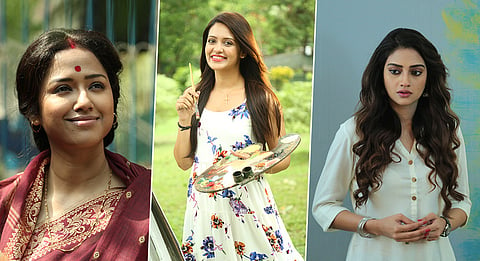
- In-Depth Stories
- Web Stories
- Reviews
- News
- FC Lists
- Interviews
- Features
- FC SpecialsFC Specials

It's rare to come across a teaser trailer that has no male characters on view. And that is probably what has piqued viewer interest in Birsa Dasgupta's new film, Crisscross, produced by SVF Entertainment. Adapted from Smaranjit Chakraborty's 2014 novel of the same name, the film tracks the stories of five women – Ira (Mimi Chakraborty) a career-driven photojournalist; Rupa (Sohini Sarkar), a homemaker who is a victim of domestic violence; Meher (Nusrat Jahan), a struggling actor who refuses to compromise on her principles; Suzy (Priyanka Sarkar), a single mother trying to bring up her child in a regressive society; and the ambitious Miss Sen (Jaya Ahsan), who prioritizes success over relationships – on a day their lives intersect in ways none of them had envisaged.
For thirty-eight-year-old Birsa Dasgupta, who debuted with 033 in 2000, the film has been a series of challenges. The primary one lay in adapting the novel. While the novel narrates the stories of each of these characters one after the other, the film weaves in and out of their lives to create an intriguing kaleidoscope of interrelated vignettes that run parallel to each other. And that is where Dasgupta credits his writer Mainak Bhaumik, a film-maker in his own right, whose film Happy Pill released only last week.
Then there was the absence of a 'hero' in a film culture that is essentially male-driven. "When I was asked about the actors and I mentioned Sohini, Mimi, Priyanka … the response was: who is the hero? As far as I am concerned, they are my heroes. At some level I wanted to establish that a woman-centric film, that too one with five women protagonists, can resonate with the audience. Yes, it's a risk given the demands of the box-office, but it's a risk worth taking – it's easy to play safe, the challenge lies in getting out of your comfort zone, and that is what we have tried to do."
Sohini Sarkar, who has been quite prolific of late with Bidaay Byomkesh and Happy Pill, is happy about the way her character Rupa has shaped up: the everyday woman, docile, exploited, tied to the norms laid down by society, who learns to stand up for herself. "It is the realistic tone that attracted me … and it gave me the opportunity to explore a character different from what I have done so far – be it in Phoring or Bidaay Byomkesh or Bibaho Diaries. The only other character I would probably have exchanged mine for is that of Suzy, because it would have enabled me to explore the realities of a new-age woman. Nusrat Jahan, however, believes that the director was so spot-on with the casting that every actor fit the character like a glove. "I wouldn't change my character for anyone's – I related to Meher, her uncompromising nature – shay taar adorsho bisarajon deye na (she will not sacrifice her principles at any cost)."
"When I was asked about the actors and I mentioned Sohini, Mimi, Priyanka … the response was: who is the hero? As far as I am concerned, they are my heroes. At some level I wanted to establish that a woman-centric film, that too one with five women protagonists, can resonate with the audience.
For Mimi, the challenge of playing a photojournalist is what drew her to the film. 'I have never played a journalist before – and the many shades of Ira, independent, strong-headed, yet vulnerable, makes the character fascinating. The other character I would have loved to essay is Rupa, because of the challenge it offers a modern woman like me.'
Interestingly enough, Birsa Dasgupta, grandson of pioneering documentary film-maker Harisadhan Dasgupta, has been an assistant to Anurag Kashyap in Black Friday, earning acclaim for his music video for the Indian Ocean song 'Arey ruk ja re bandeh'. "I made my first documentary when I was in Class 12. In fact, I worked in docu-features for a couple of years before I moved to Bombay. At that point, I felt I was stagnating in Kolkata." He found work in the AV wing of Mid Day under Arindam Mitra, who produced Black Friday. Coming into the film from the producers' end, he learnt the ropes of film-making from Anurag and his team, before deciding to return to Kolkata to make his first feature. "When I realized I was ready to make my first film, I wanted to do it in my own language, Bengali." And thus began the journey that has led him to direct eight films in the last ten years.
He, however, plans to return to Mumbai soon. "I want to go back. I have been around for twenty years and I cannot help feeling that we are somehow still stuck in catering to nostalgia. I am a craftsman, and I have always felt that we are so tuned to the culture of the "golpo", the narrative, that we don't appreciate the craft behind a film, the effort of a craftsman. Mumbai, by contrast, offers not only greater reach but also respects the craftsman."
"I have always tried my hand at different genres … Obhishopto Nighty was probably the first sex-and-politics satire in Bengali; in Shob Bhuture I wanted to convey the childhood thrill of listening to ghost stories. Crisscross pushes the envelope further – in many ways it's a first of its kind in the industry," Dasgupta says, signing off.